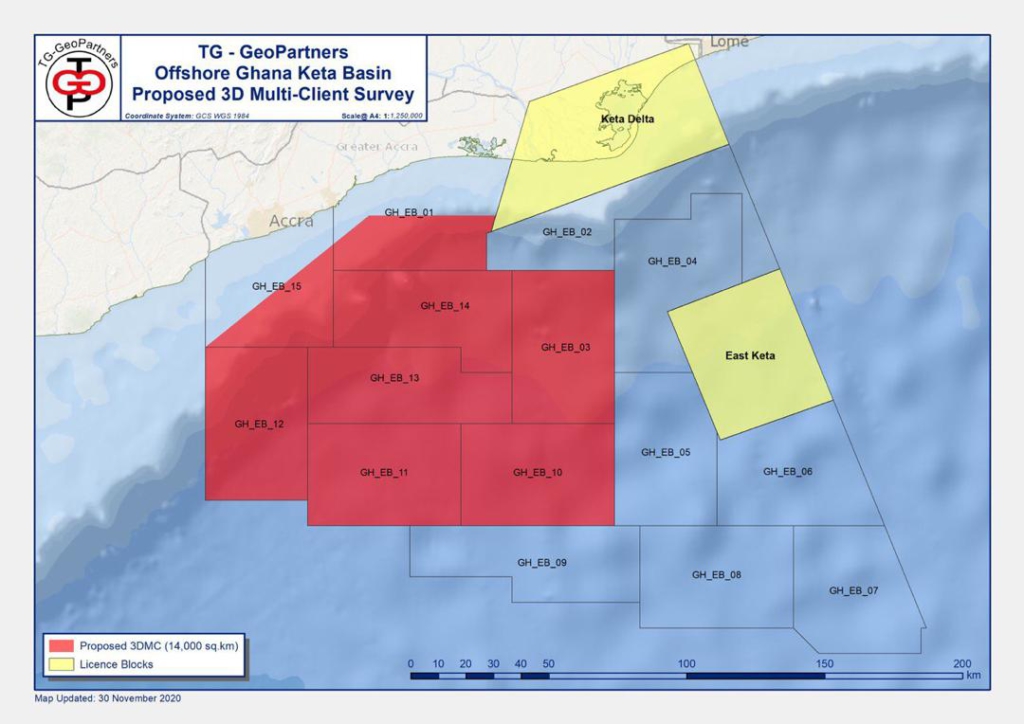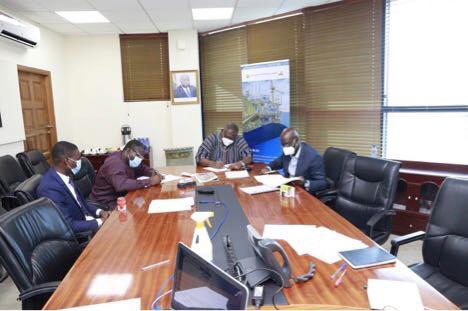The country’s upstream petroleum industry regulator, Petroleum Commission, has signed a pact with TG-GeoPartners to conduct a major multi-client 3D geophysical survey in the offshore Keta Basin in the Volta Region.
The new multi-client 3D seismic acquisition programme is expected to help unlock and accelerate development of what could be the next wave of major oil discoveries in the country.
14,000 square-km
The project, which will comprise the acquisition of about 14,000 square-km of 3D-long-offset broadband multi-client seismic over open blocks that would be available for application.
The Chief Executive of the Petroleum Commission, Egbert Faibille Jr., signed on behalf of the Commission, while the Managing Director of TG-GeoPartners, Thomas Tsiboe-Darko signed for the partners.
The advanced new acquisition and imaging techniques would provide improved illumination of complex structures and the process of acquisition is set to commence in early 2021 over the period of 10 months, with final processed volumes available in both time and depth by the second quarter of 2022.

In an interview, Mr Tsiboe-Darko, said the agreement with the Petroleum Commission to conduct this very large 3D seismic survey in the relatively underexplored, but highly prospective Keta Basin, offshore is welcomed news for the country.
Multi-client seismic
He said while the primary-play will undoubtedly be the late cretaceous turbiditic, which means a geologic deposit of a turbidity current, which is a type of sediment gravity flow responsible for distributing vast amounts of clastic-sediment into the deep ocean channels found in Jubilee.
“We are excited about the possibility of extensive late cretaceous and tertiary basin floor fans containing very large volumes of hydrocarbons, which could exceed the existing discoveries offshore Ghana,” he said.
Mr Tsiboe-Darko, explained that the application of its new imaging technologies is required to improve subsurface understanding and lead to the increased exploration success rates.
Cost-effective
Multi-client seismic surveys provide a cost-effective means of acquiring high-quality data as costs can be shared and larger surveys acquired for a better overall view of the prospectivity than is generally the case with smaller proprietary surveys.
It ensures access to large surveys in both mature and virgin areas allows oil companies to reduce their exploration risk and helps to reduce the time required from license award to drilling wells.
Postage-stamp-size surveys often leave holes in the data coverage, are inefficient due to the disproportionate time spent on line turns, and have different acquisition parameters and azimuths, making regional exploration more challenging.
Industry experts welcome the move by the Petroleum Commission to ensure that the country's data room would be richer and attractive to investors.
Latest Stories
-
Expansion Drive: Takoradi Technical University increases faculties
4 hours -
SHS heads demand payment of outstanding funds before reopening of schools
4 hours -
We thank God for the 2024 general elections – Akufo-Addo
5 hours -
Coconut Grove Beach Resort marks 30 years of excellence with memorable 9 lessons & carols service
5 hours -
WAFU B U-17 Girls’ Cup: Black Maidens beat Nigeria on penalties to win inaugral tournament
6 hours -
Real Madrid beat Sevilla to keep pressure on leaders Atletico
7 hours -
Liverpool put six past Spurs to go four points clear
7 hours -
Manchester United lose 3-0 at home to Bournemouth yet again
7 hours -
CHAN 2024Q: ‘It’s still an open game’ – Didi on Ghana’s draw with Nigeria
7 hours -
CHAN 2024Q: Ghana’s Black Galaxies held by Nigeria in first-leg tie
8 hours -
Dr Nduom hopeful defunct GN bank will be restored under Mahama administration
8 hours -
Bridget Bonnie celebrates NDC Victory, champions hope for women and youth
8 hours -
Shamima Muslim urges youth to lead Ghana’s renewal at 18Plus4NDC anniversary
10 hours -
Akufo-Addo condemns post-election violence, blames NDC
10 hours -
DAMC, Free Food Company, to distribute 10,000 packs of food to street kids
11 hours

